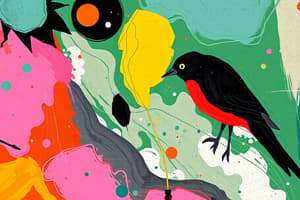Podcast
Questions and Answers
What are the components of a quest?
What are the components of a quest?
- A magical creature
- A quester (correct)
- A stated reason to go (correct)
- A dangerous obstacle
Acts of communion require a religious context.
Acts of communion require a religious context.
False (B)
What does the older figure in vampire mythology typically represent?
What does the older figure in vampire mythology typically represent?
Corrupt, worn-out values
Which type of sonnet consists of two parts with a unified rhyme scheme?
Which type of sonnet consists of two parts with a unified rhyme scheme?
There is such a thing as a wholly original work of literature.
There is such a thing as a wholly original work of literature.
Which literary work is referenced as an example of influence in storytelling?
Which literary work is referenced as an example of influence in storytelling?
In what ways can biblical references be utilized in literature?
In what ways can biblical references be utilized in literature?
What does the term 'literary canon' refer to?
What does the term 'literary canon' refer to?
Myth is a body of story that __________.
Myth is a body of story that __________.
How does weather function as a literary device?
How does weather function as a literary device?
Violence in literature can have both personal and societal implications.
Violence in literature can have both personal and societal implications.
What is the difference between symbolism and allegory?
What is the difference between symbolism and allegory?
What does the phrase 'it's all political' imply in literature?
What does the phrase 'it's all political' imply in literature?
Flashcards are hidden until you start studying
Study Notes
Quests
- Every journey is a quest unless stated otherwise, involving a quester, destination, reason, challenges, and self-discovery.
- Real purpose revolves around self-knowledge and personal growth.
- Examples include "Huckleberry Finn," "The Lord of the Rings," "Star Wars," and "Crying of Lot 49."
Acts of Communion
- Eating or drinking together symbolizes communion, characterized as sharing and peace.
- This act represents common ground among characters, regardless of religious connections.
- Literature examples: "Tom Jones," "Cathedral," and "The Dead."
Vampires
- Vampires and ghosts symbolize deeper themes beyond the supernatural.
- Common traits include an older male figure corrupting a youthful female character, often linked to sexuality.
- Examples include Marley's ghost from "A Christmas Carol," Daisy Miller, and Tess from "Tess of the D'Urbervilles."
The Sonnet
- Sonnets, stemming from the Renaissance, have 14 lines and typically 10 syllables per line.
- Two common forms: Petrarchan (Italian) with an 8-line stanza followed by a 6-line stanza, and Shakespearean, containing three quatrains and a couplet.
Originality
- No literature is wholly original; all works are influenced by prior narratives and archetypes.
- The concept suggests a singular overarching story that connects all literature, resembling a "barrel of eels."
- Examples: "Going After Cacciato," "Alice in Wonderland," "Sons of Anarchy," and "The Lion King."
Shakespeare
- Many literary references and quotes stem from Shakespeare's works, often without direct attribution.
- Famous line from "Macbeth": "By the pricking of my thumbs, something wicked this way comes."
The Bible
- Biblical texts serve as a source of inspiration, transcending religious functions, influencing moral themes.
- Nonsectarian references are drawn from various literary works, notable example: "East of Eden" by Steinbeck.
Fairy Tales
- The literary canon evolves over time, with fairy tales providing rich ground for parallels and plot structures.
- Themes of children's vulnerability are prevalent, exemplified by stories like "Hansel and Gretel."
- Foster highlights the mix of strangeness and familiarity desired in storytelling.
Myths
- Myths offer storytelling frameworks that explain human experiences beyond scientific explanations.
- Notable recreations include "O Brother, Where Art Thou?" and Joyce's "Ulysses," which reflects themes from Homer's "Odyssey."
Weather
- Weather is a significant literary device that enriches themes and emotional atmospheres in stories.
- It serves multiple functions, such as plot devices, symbolism, and setting tone.
- In "A Farewell to Arms," rain represents both restoration and mourning.
Violence
- Violence in literature reveals intimate human experiences and broader societal issues.
- Two categories: specific injurious acts and narrative violence, which include character suffering for thematic impact.
- Examples: Sethe's tragic choice in "Beloved" and the farm boy's accident in Frost's "Out, Out..."
Symbolism
- Symbolism is not confined to single interpretations; symbols can hold multiple meanings.
- Distinction between symbolism and allegory noted; allegory conveys direct relations.
- Significant symbols include rivers representing freedom and maturation in literature, as seen in "Huckleberry Finn" and Crane's poetry.
Politics
- Literary works inherently contain political elements, influenced by their creation context.
- Understanding socio-political conditions helps interpret the political dimensions in literature.
- Examples: Dickens critiques poverty in "A Christmas Carol," and Irving's "Rip Van Winkle" addresses post-Revolution America.
Studying That Suits You
Use AI to generate personalized quizzes and flashcards to suit your learning preferences.




